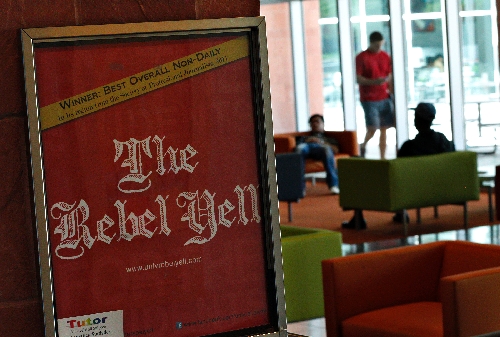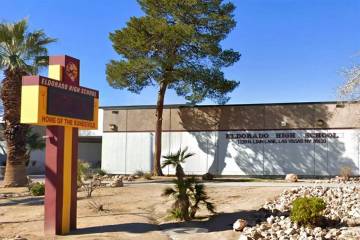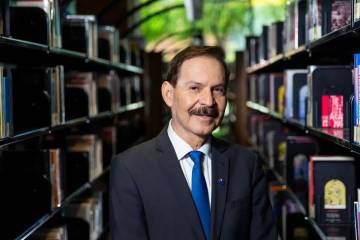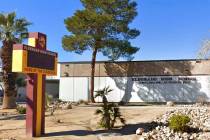Squabble could stifle Rebel Yell in fall
An advisory board could stop the presses on the UNLV student newspaper Monday.
The Rebel Yell Advisory Board is scheduled to vote on whether "to suspend the publication of the Rebel Yell for the fall semester or until issues regarding its legal status are resolved." The focus of the dispute is who gets to choose the newspaper's editor-in-chief.
The Advisory Board appointed editors for the past 16 years, but its authority was challenged this spring by Mark Ciavola, new student body president at the University of Nevada, Las Vegas.
Unbeknownst to the Advisory Board, the Board of Regents in 2009 inadvertently gave power to select the editor to UNLV's student government.
The vote will come at the Advisory Board's monthly public meeting at 10:30 a.m. at the Tam Alumni Center's Albrecht Board Room on campus. The 11-member board consists of UNLV student representatives, faculty members and outside media professionals.
In April, the board voted for Maria Agreda to succeed Ian Whitaker as editor-in-chief. Agreda was removed from the position after the UNLV Office of General Counsel ruled that student government is the only entity that can select the editor-in-chief. Whitaker was retained as interim editor.
Advisory Board member Mary Hausch, a UNLV journalism professor, said, "We can't let the editor that's in there now stay in there. ... Before the fall semester starts, we have to have somebody in place we can legally have as editor, or we really can't have a paper."
The Rebel Yell operated from 1955 to 1995 as part of student government. In 1995, the Advisory Board was created to manage the newspaper's budget, select the editor-in-chief and give guidance on policies. The board does not exercise any control over the paper's content.
The Consolidated Students of UNLV Senate did not revise its constitution to reflect the change in the editor-in-chief selection process.
Former Rebel Yell staff members, media professionals and Advisory Board members have expressed concern about student government selecting an editor-in-chief.
"We don't have the County Commission or City Council selecting editors of the Review-Journal," Hausch said. "And the president of the United States certainly doesn't get to pick the editor of the New York Times. You need the media, the press, to be the watchdog of the government."
Hausch said UNLV President Neal Smatresk could resolve the issue, and Board of Regents Chairman Jason Geddes agreed.
"If President Smatresk said, 'I would like this on the agenda, I would like it changed,' we would definitely put it on the agenda and debate it," Geddes said.
Smatresk was unavailable for comment because he was attending the UNLV Singapore graduation ceremony.
The Board of Regents is scheduled to meet in September in Reno and in December in Las Vegas.
Until April 2009, the Advisory Board had the authority to appoint an editor under Title 5, Chapter 22 of the Board of Regents Handbook. The regents removed Title 5, defaulting to Title 4, Chapter 19, Section 1, which states, "Editors of all publications are appointed by CSUN and serve at the pleasure of CSUN."
Geddes said the editor-in-chief selection switch was an unintended consequence of the Board of Regents' attempt to give universities more control to govern themselves. Geddes said the Board of Regents would be more apt to change its policy if the student government at UNLV approves the change, too.
Geddes said the regents could consider resolving the dispute, but the board cannot change UNLV's student constitution.
The Rebel Yell is funded in part by 8.7 percent of collected student fees. The money is taken from the $2.47 the student government collects from every student for each credit hour, according to the UNLV Budget Office.
The Rebel Yell received about $111,000 last school year, about half of its budget. Advertising accounts for the rest of the paper's revenue.
Ciavola has been critical of the Advisory Board's disdain for student government meddling and synchronous financial dependence on it. He said he has been accused of trying to take over the newspaper and called those accusations "inaccurate and disingenuous."
"My end goal is to ensure that the Rebel Yell is both independent and free from student government control," Ciavola said. "We have no interest in taking over the paper. If we did, we would have appointed an editor-in-chief (in May), and it would be done."
Ciavola said he will make a proposal at Monday's Advisory Board meeting. His plan would amend the original senate resolution that separated the Rebel Yell from student government in 1995 but did not transfer the power to appoint the editor-in-chief. The Advisory Board would be given that power.
The plan would also remove student government as the conduit for funding. Rebel Yell's funding would still come from student fees but would be funneled through a special fee committee created in 2010 during the university's budget crisis.
Details of Ciavola's plan could change as it is discussed this week with university administrators.
The special fee committee consists of members of student government, including Ciavola, the vice president of student affairs, the CSUN business manager and a representative from the Office of Civic Engagement and Diversity.
The proposal would have to pass the CSUN Senate and Advisory Board by a two-thirds vote. Ciavola said the proposal potentially could be voted on by the senate at its meeting later this month and by the Advisory Board at its July meeting.
Whether a university proposal passes, the Board of Regents Handbook still supersedes it, and CSUN student government will retain power to select the editor-in-chief unless the regents amend the handbook.
Contact View reporter Jeff Mosier at jmosier@viewnews.com or 702-224-5524.






















